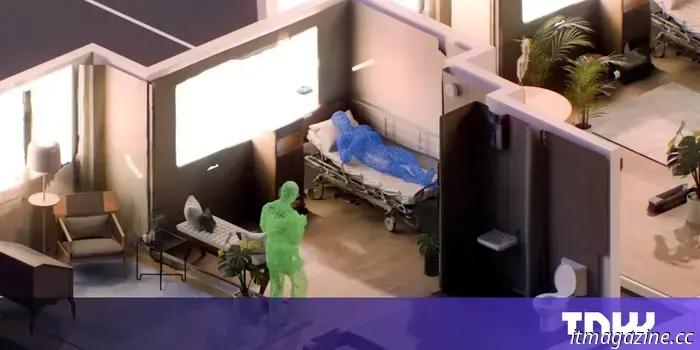
Exclusive: Danish supercomputer drives AI care 'companion' for healthcare facilities.
Danish startup Teton has utilized Gefion, one of Europe's most potent supercomputers, to enhance the creation of its AI "care companion" for hospital staff.
Teton installs cameras and sensors in hospital rooms to collect real-time data, which is then processed by an AI algorithm to create a virtual "digital twin" of the room. This model tracks patient and staff behaviors, including movement, breathing, and changes in posture. If it detects an issue, the system notifies nurses through an app.
To safeguard privacy, all data processing occurs on-device, with no information sent to the cloud. Personal data or raw video footage is not stored; instead, the video is instantly converted into 3D spatial representations, and the original footage is erased.
Teton aims to assist hospital staff in identifying early signs of health problems and responding more quickly to potential hazards. The company also seeks to alleviate the burden on nurses by continuously monitoring patient rooms, potentially decreasing the need for manual checks and automatically generating care notes.
The AI care companion has been tested at two Danish hospitals with encouraging results, showing up to a 25% reduction in nightshift workloads according to the company's research.
Founders Mikkel Wad Thorsen and Esben Klint Thorius have dedicated years to training their AI model using actual patient scenarios. They even employed actors and nurses to simulate situations repeatedly to refine their training data. However, these manual methods are time-consuming, which is where Gefion, Denmark’s AI supercomputer, has played a pivotal role.
With the supercomputer, Teton generated over one million 3D scenes of hospital rooms, each depicting different scenarios, such as a patient turning over in bed, a nurse checking vitals, or someone in distress.
These scenes are not merely static images; they are dynamic settings that replicate how people and objects interact in real life. By producing such a large variety of scenarios, Teton can expose its AI to numerous situations beyond what manual methods could achieve. This exposure aids the system in recognizing subtle patterns and responding effectively in actual clinical environments.
"Gefion has significantly accelerated the rate at which we have been able to develop our AI model," Thorsen shared with TNW. "Unlocking the geometric knowledge enables us to make much more accurate predictions and assessments of a patient's condition,” he added.
Thorsen hopes these advancements will ultimately facilitate improved patient care in hospitals and relieve the pressure on care staff.
The EU currently faces a shortage of 1.2 million doctors, nurses, and midwives, compounded by a declining interest in nursing careers in over half of the EU's 27 nations, according to OECD research.
The nursing shortage is a global challenge, prompting various startups to seek tech-based solutions. One such startup, Stockholm-based Bemlo, has developed a platform for the short-term hiring of nurses and doctors, allowing hospitals to quickly onboard new personnel. Other initiatives focus on directly assisting nurses. US-based Diligent Robotics has created Moxi, a mobile robot designed to help reduce monotonous and repetitive tasks in healthcare settings.
Leveraging supercomputing power and digital twins, Teton is betting that AI can help alleviate the burden on overworked hospital staff. The startup is now aiming to expedite the development of its algorithm. "With all these new data points, we could significantly speed up the iteration process and unlock a new scale for the next generation of our model," Thorsen stated.
Exclusive: Danish supercomputer drives AI care 'companion' for healthcare facilities.
The Danish startup Teton has utilized one of the most powerful supercomputers in Europe to train its AI, which assists nurses in caring for their patients.

